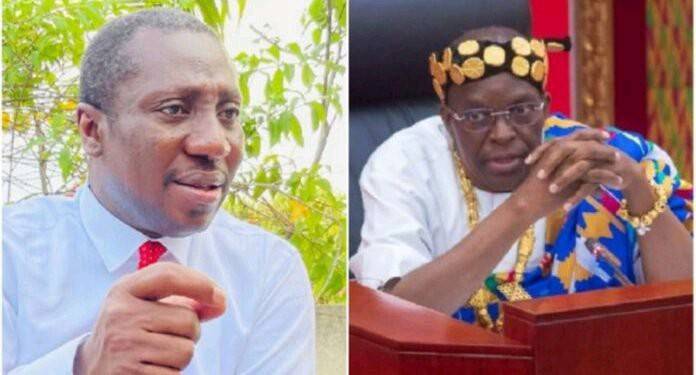In a landmark decision, Ghana's Supreme Court has ruled in a 5-2 majority verdict in favor of the Majority Leader, Alexander Afenyo-Markin, upholding his challenge against Speaker of Parliament, Rt. Hon. Alban Bagbin, on the controversial declaration of four parliamentary seats as vacant. The ruling, which has sparked significant discussion within Ghanaian political circles, effectively overturns Speaker Bagbin’s decision to remove Members of Parliament from four constituencies—Fomena, Suhum, Amenfi Central, and Agona West—after they expressed their intention to contest the upcoming parliamentary elections as independent candidates. The full legal reasoning behind the court's ruling is expected to be filed on Wednesday, November 13, 2024.
The issue at the heart of the dispute stems from a ruling by Speaker Bagbin earlier this year. In his decision, Bagbin declared the seats for these four constituencies vacant, arguing that MPs intending to contest elections as independent candidates had, in effect, forfeited their party-affiliated seats in Parliament. According to Bagbin, this intention amounted to a “break in party allegiance,†and, therefore, the MPs could no longer be seen as representing the party for which they were initially elected. The Speaker's decision was based on Ghana’s Constitution, which prohibits MPs from switching allegiance mid-term without losing their seats.
Afenyo-Markin, a key figure in the New Patriotic Party (NPP) caucus, immediately challenged this interpretation, asserting that Bagbin’s decision was an overreach and not in alignment with constitutional law. Afenyo-Markin argued that the MPs' stated intent to run as independents in upcoming elections did not necessarily disqualify them from serving their current terms. According to Afenyo-Markin, the Constitution does not prohibit MPs from expressing future political intentions, and only upon actual disaffiliation or party exit would their seats be automatically vacated.
The dispute was particularly charged in the case of the Fomena constituency. Fomena's MP, who originally won the seat on an NPP ticket, had a history of running as an independent. In the previous election cycle, he won as an independent candidate, rejoined the NPP in Parliament, and has since been considered an essential figure in the Majority bloc’s strength. By declaring the Fomena seat vacant, Bagbin’s ruling posed a risk to the parliamentary numbers of the Majority bloc, potentially tilting the balance of power within the House.
This backdrop underscored the high-stakes nature of the Supreme Court’s involvement in the matter. After months of legal arguments and public debate, the Supreme Court ruled in Afenyo-Markin’s favor, siding with the Majority Leader’s interpretation of the Constitution. In its majority decision, the court asserted that merely expressing intent to run as an independent in the next election does not violate Ghanaian parliamentary rules nor automatically strip MPs of their current seats. The court also clarified that until an MP formally breaks from their party affiliation or is dismissed by their party, they retain their position in Parliament.
This decision is expected to have significant ramifications not only on the standing of the four MPs but also on broader parliamentary dynamics. By reinforcing the MPs' right to express their electoral intentions without the immediate consequence of seat forfeiture, the Supreme Court has set a precedent for how such cases will be handled in the future. It is widely believed that this verdict safeguards the autonomy of MPs to some extent, allowing them room to express individual political aspirations within the legal framework.
Political analysts and commentators have voiced various reactions to the ruling. Some see it as a win for democracy, arguing that it allows MPs a degree of freedom to consider their political futures without fear of retribution or loss of office. Others believe that the court’s decision could prompt more MPs to explore independent paths or affiliations in upcoming elections, potentially diluting party cohesion and complicating legislative processes.
This verdict may also add a layer of nuance to the already complex relationship between the Speaker and the Majority caucus. Bagbin’s approach has often been described as independent and impartial, with his office keen to assert the power and autonomy of the Speaker. However, Afenyo-Markin’s successful challenge represents a check on that authority, reminding the Speaker of constitutional limits, particularly when decisions could alter the balance of power in Parliament.
In response to the ruling, several members of the NPP have urged caution and emphasized the importance of unity within the party. NPP leaders hope to leverage this legal victory as a stabilizing factor, urging MPs to remain aligned with party ideals despite any personal ambitions they may pursue.
With the full legal reasoning set to be filed shortly, political observers await further insights into the court’s rationale, particularly any details that may address the limits of the Speaker’s authority. This explanation will be crucial for future parliamentary governance, as it may further define the boundaries between the Speaker's powers and the MPs’ individual rights.
Afenyo-Markin’s victory in the Supreme Court is significant, reaffirming the constitutional principle that MPs serve at the pleasure of the electorate and are not subject to premature removal solely based on their political aspirations. This ruling is expected to shape Ghana’s parliamentary landscape as the nation approaches the next election cycle. The Majority Leader’s win not only reinforces his standing within the NPP but also strengthens the parliamentary presence of his caucus, which has benefited from the retention of these four MPs.
This legal episode underscores the importance of constitutional interpretation in matters of governance and affirms the Supreme Court’s role as the final arbiter in disputes of this nature. As Ghana prepares for the 2024 elections, this ruling may encourage broader discussions around electoral reform and the autonomy of MPs within the constraints of party allegiance. With political stakes and party dynamics intensifying, this decision is bound to have a lasting impact on Ghana’s legislative and political future.


